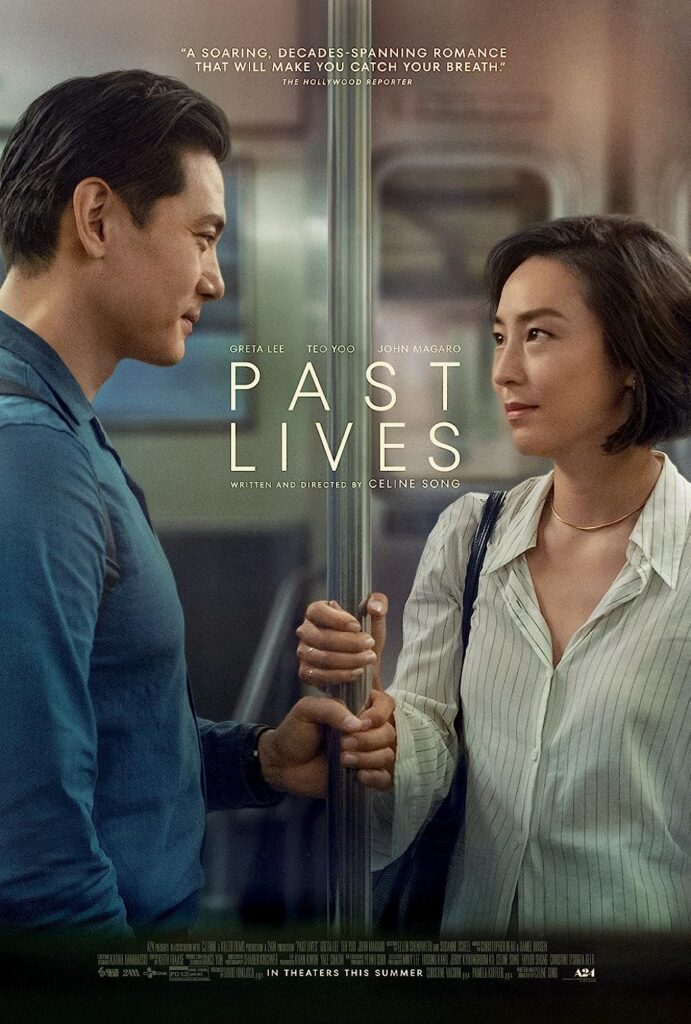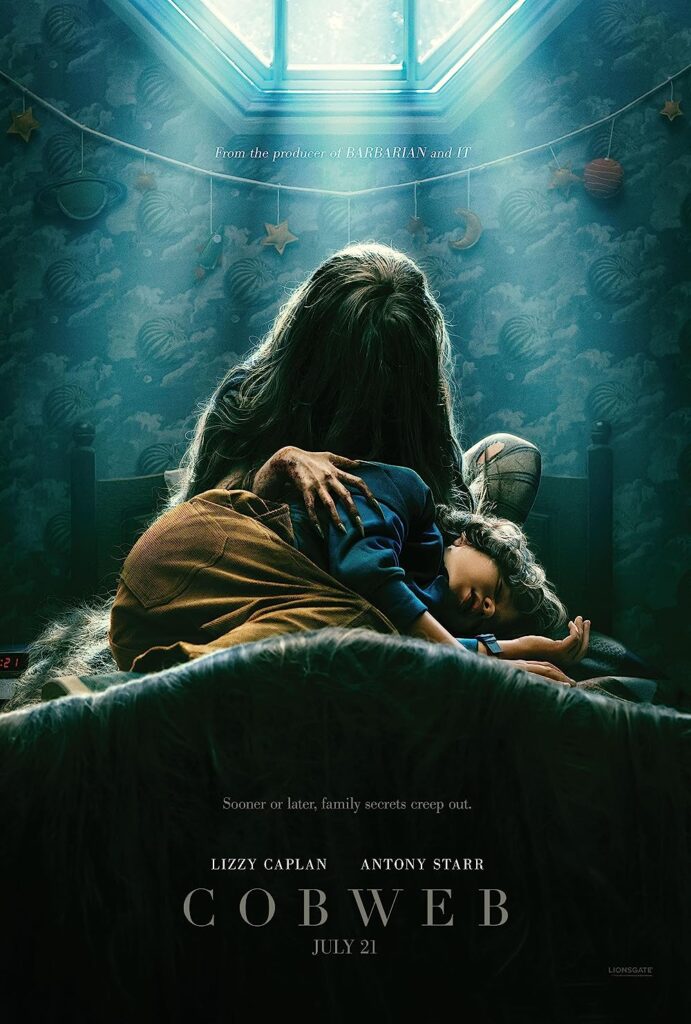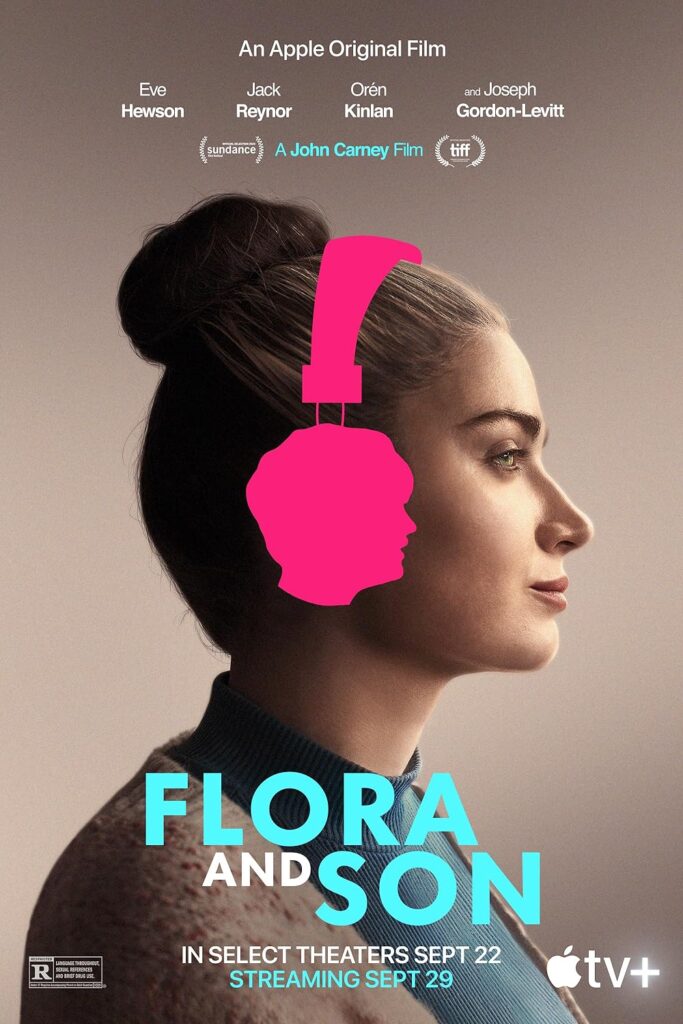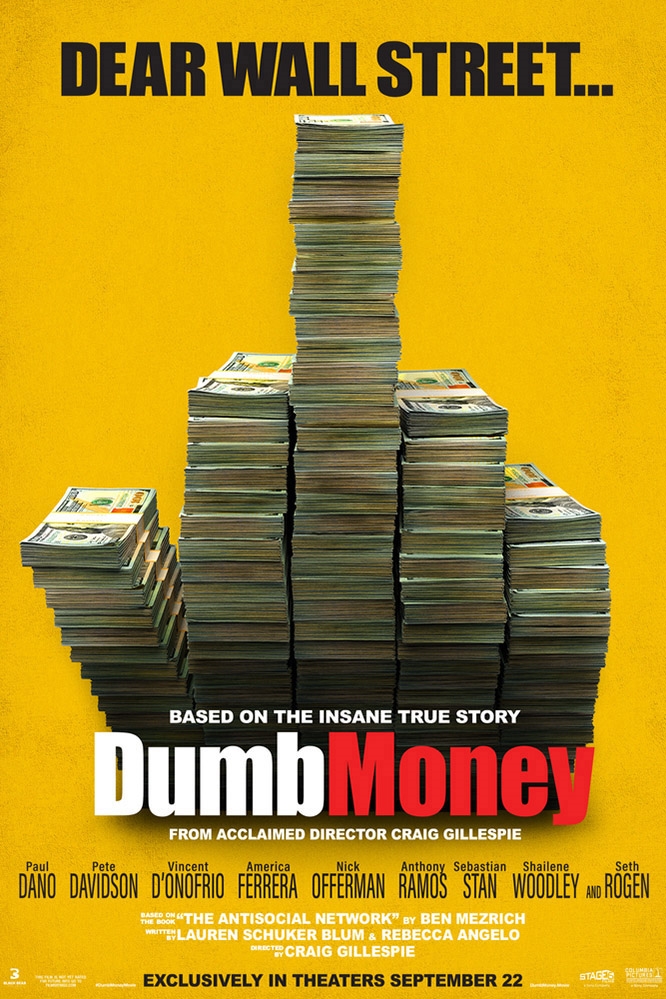Cinema Corner is the latest edition to Post-Burnout. Here, we explore the world of cinema, through whatever lense that takes. Today, our Film Editor, Dale Kearney, discusses the recently-released films Past Lives, Cobweb, Flora and Son, and Dumb Money.
_____________________________________________

Past Lives
Throughout life, there are so many what-if scenarios. What if I left home and moved abroad? What if I reconnected with a young childhood friend? What if I fell in love with someone at a writer’s retreat? Alright, that last one can be a little too specific, but this film asks all those questions. Unlike a current trend in cinema with multiverse stories, Past Lives focuses on what is present. Toying around with the idea of endless possibilities of what would’ve happened if a certain choice was made, all while remaining in the moment. The quote from Everything Everywhere All at Once echoes out: “In another life, I would have really liked just doing laundry and taxes with you.”
The film opens up with two men and a woman sitting together at a bar. Two voices speak over them as they try to guess the relation that these people have to each other. We’re then taken back twenty-four years to South Korea, where we follow a young girl who is crying after being topped by her male classmate in a school test. The girl then tells the class that her family is emigrating out of Korea. News to which the boy doesn’t respond well, leading them to walk home together in silence as they both physically and literally go on separate paths, which is then shortly followed up by a deliberate title card stating “12 years pass.”
The choice to state “Pass” instead of the stereotypical “Later” relays a key message of the film: That time passes. People change within these twelve years rather than suddenly becoming a different person. That same kid you knew all those years ago is now an adult and all grown up. They might’ve even changed their name to Nora and is now a writer with the dream of winning the Pulitzer Prize. And even though all this time has passed, in typical movie fashion, the childhood friends reconnect to begin flirting with one another via Skype. Yet the reason they’ve come together again doesn’t seem to be through contrivance, rather the more Buddhist outlook of inyeon, which basically means that if you meet someone, you’ve met before in a past life. The more you meet, the more likely it is for you two to become lovers. A Korean proverb told by Nora to seduce Arthur, another writer at the retreat.
If it’s not clear by now, this is a film about love. Romance. There’s no antagonist here to make the audience hate. In fact, hate can’t be found anywhere in this. It’s an understanding movie to all of its characters. So much so that one of the characters goes through the effort to learn Korean to understand someone in their sleep. And it asks the same of the audience. To understand what is happening, because what is put on the screen can be abstract in what the film is really trying to say. After leaving the cinema, I wasn’t too sold on the idea of it. But it grew more on me as I mulled it over the course of the day. Still not quite reaching the height of the effects it has had on many other people.
Shooting this on film was a superb choice from Celine Song and her DP. Film brings this tangibility to it. An aura of living in the moment. As opposed to digital which can give off this preserved feel to it. This is raw and doesn’t give off the impression that any other factors are at play here. Leaning into the naturalistic elements of the film. To plainly put it, film just makes it more real. Same with the score which finds its way into the scenes at just the right time. But there’s something about the way the story flows. If the technical elements pop in at the right time, does the story? Time passes for the characters but I don’t feel as connected to them as I possibly could. Somehow, there’s a disconnect that has formed. I wasn’t as emotionally involved with them as I could’ve been. Even if there is some clever direction going on display. I’m just as distant as Hae Sung feels in Korea to Nora in New York. Maybe this is one of those films that after twelve years pass, I’ll look back on what has changed about me and view it differently. Or maybe, in another life, it was the sunshine of my lifetime.

Cobweb
There’s an irritating feeling of disappointment when you’re watching something that should seem good on paper but falls flat in the execution. Cobweb provokes that feeling. As you watch it, you think to yourself there’s a much better movie in here if it stuck to certain elements of the script. Instead, it’s too busy trying to blow away the dust of the old tropes it clings on to.
Peter, played by Woody Norman, hears banging on his walls at night, making him go and wake up his parents, only for them to investigate the noise to hear nothing. Peter then goes to school where he is an outcast and is bullied by other students. Only for the new substitute teacher, Miss Devine (Cleopatra Coleman), to throw a watchful eye over him to see that there may be some problems outside of school that could be affecting him. To which she finds out that his parents, played by Lizzy Caplan and Antony Starr, are not who they seem to be.
Cobweb takes elements from horror films that come before it but never grasps them. Films like The Exorcist, The Ring, Barbarian, Malignant, and even this year’s The Boogeyman. Still, with adding all those films into the mix, it doesn’t come out with a unique identity to set it apart. The first two acts are horrifically slow in build-up. With not many scares that could make you jump in your seat. Nor the tension that would keep you intrigued to wait for those moments. Instead, it fills its time with misdirects that are only there to mislead the audience. They aren’t clever because they are all red herrings by means of being completely pointless. Having no impact on the story. At some points, I questioned whether I was watching a horror film or a grotesque action film. Because the horror is directed in a way that isn’t nail-biting, rather, in a way that seems like it’d be cool.
Antony Starr gives an unnerving performance of the father, while Lizzy Caplan gives an unnerved performance as the mother. The two don’t play off each other well as it seems like they’ve been given different information on each scene. Coleman gives as good of a performance as she can for a character whose part in the story feels so forced upon it. Miss Devine is just one big push when the story has to progress further. Just give her a call and she’ll be there to help the writer out.
By far the most interesting aspect of Cobweb is the stuff we don’t see. Using shadows on walls and the floor to show a looming presence is perhaps the scariest thing about this film. Those images in particular are some of the few that stand out to me besides several mid-shots of a boring, plain wall. Which isn’t visually interesting nor scary. A complete opposite to the shadows. It’s only in the last act that the film gets a burst of much-needed energy. Hiding features of what would be considered the threat of the film. Taking Jaws‘ idea of hiding instead of showing to give it a more atmospheric punch. But just when you think they might have saved the domestic abuse-filled film with its final twenty minutes, it goes ahead and rushes the ending like it needs to wrap up because an audience member has to run out of the screen to head to the bathroom. Much like its title, this film would be better off remaining in the corner amongst the cobwebs. And will be forgotten about in years to come.

Flora and Son
Prior to watching a John Carney film, you can probably guess what it’s going to entail. Using certain dream-like scenes to portray how magical music can be. A relationship between not only the music but the two main leads of the movie. The discussion of where home is and possibly leaving their current situation to travel elsewhere. While also taking on the topic of family. And yep, this film checks all those boxes, one way or another. It doesn’t excel in any of these aspects but does a commendable job of doing them all.
Eve Hewson plays Flora, giving an absolute powerhouse of a performance as the mother of a teenage boy, Max (Orén Kinlan), trying to raise her child between two homes, split between hers and her ex-partner’s. After trying to give Max a second-hand guitar, she becomes the owner of her own gift due to Max not caring less about it. When it comes time for Max to stay at his dad’s, played effortlessly by Jack Reynor, Flora feels challenged to learn the guitar to prove that some talent that Max has comes from her side of the gene pool. Enter Joseph Gordon-Levitt as the online guitar teacher from LA to help this rave-loving, highly flirty, foul-mouthed, inner-city Dublin mother learn to play the guitar.
I never thought that Eve Hewson could play a character like this, but she takes it in her stride. She fully embraces a character who resides in junkie-ridden flats. An incredible sense of authenticity comes across with what looks like little effort. Showing off all her acting chops from the emotional scenes all the way to her comedic side. She’s the deserved star of this film. Sadly, this can’t be said for her son who comes across flat and monotonous at worst and irritating at best. Which kind of works in its favour as these characters are super shallow when we first see them. Carney does well to make us care about them after digging such a hole for them to begin in. Lest we forget Jack Reynor, who plays a side character that’s a total has-been in the music industry to perfection. He’s a scene stealer, utilising all the screen time he gets. Joseph Gordon-Levitt also snatches at the opportunity to play his dream role of a musician. Coming off as this all-knowing guitar guru flawlessly.
It wouldn’t be unfair to say that this is Carney’s most comedic work yet. Writing in humour that is super true to Dublin’s unbashful honesty. On many occasions, I did find myself silently chuckling away in my seat. The magic dream-like music moments found in his earlier films return in a smaller fashion here with the video calls turning into reality halfway through them. A trick that occurs a little too often to make it a standout. But it really gets across the point that art and, most importantly in this case, music can break any barrier put in front of it. Whether it be a computer screen or an ocean. Music always brings people together in John Carney’s films. So, it doesn’t come as a surprise when it brings a mother and her son closer together because of it.
For as wholesome as it sets out to be, the true downfall here is the lack of a conclusion towards the story beats which have been built up over the hour and a half. Wrapping up the film with a rather underwhelming finale that’s rather untypical from his previous work. Same can go for some of the songs; with none of them standing out as much as “Drive It Like You Stole It” or “Falling Slowly.” The film goes out on a whimper compared to the bombastic presence it had prior to the third act. But it still remains grounded with the authenticity of an Irish (Dublin to be specific) story.

Dumb Money
2023, the year of the corporate biopic. From Air to Flamin’ Hot to Blackberry to Tetris. I will loosely call this a corporate biopic, mainly because it wouldn’t exist without GameStop. Just put a hyphen between the corporate and the biopic part and you’ll get this. It puts all its money into retelling a true story but does it pay off?
I’m sure many people will remember the story, due to how recently it was, but in case anyone needs a reminder. This is based on the true events from 2020 and 2021, where GameStop’s stock skyrocketed due to people buying shares in it. Spearheaded by Keith Gill aka Roaring Kitty aka DeepFuckingValue aka Paul Dano. Convincing people via Reddit that they should invest in GameStop, which he believes is undervalued. The result leaves hedge fund managers losing billions a day due to this act. But why GameStop in particular? He just likes the stock.
That’s just the condensed version of the condensed explanation that the film portrays, as legal stuff is simply never that easy. The film is based on a book called The Antisocial Network. It also happens to be produced by Cameron and Tyler Winklevoss. Why do I mention these things? Well, they remind you of another film about recent history that does it right. I think it’s easier to draw a line from this to The Social Network than any of the corporate biopics I’ve mentioned. The Social Network was more than a Facebook origin story. It was about how money can split a friendship and turn each other against one another. Here, we get a retelling of the events with snippets of people who were involved in this situation. The core goal of the film is to pump out a story about this recent event as quickly as possible rather than tell the story of these people’s lives and how it really affected them. The results of this film are still unclear, and it was unwise to make a film about it a mere two years after it occurred. Going back to The Social Network, obviously the story isn’t done for Facebook but it focused more on the characters in that story than the company, which is why it works.
While there are great performances in here from Paul Dano and Shailene Woodley, who plays his wife, Caroline Gill, it’s not enough to keep you engaged in caring that much about them. They come across as players in this larger story rather than being the centrepiece of it. And because it also follows other side characters such as a nurse by the name of Jennifer Campbell, played by America Ferrera, or Sebastian Stan’s co-owner of Robinhood, Vlad Tenev, we dip in and out too much to get invested as the characters it is portraying. Craig Gillespie has so much on his plate that he tries his hardest to dish out fair shares to each one but can only give a small portion as a result.
That being said, Craig Gillespie seems like a great choice to take the helm of a story like this. Going back to his previous triumph of I, Tonya, he knows how to handle a real-life person, who is an underdog, with great care. But it’s hard to say that his latest outing is near the levels of I, Tonya. Not through his own fault, rather the case of telling a story too soon. Managing to wrangle a confusing enough narrative that it is and making it digestible to the standard viewer is an achievement in and of itself. It’s just a shame that once you’ve understood the concept, there’s not much left to chew on besides its “stick it to the man” attitude.
Perhaps in a few more years, there’ll be a much greater story to be told about this event where it isn’t the focal point. For now, it just seems like a load of Hollywood execs selling while the story is fresh in everyone’s mind.

Dale Kearney is the Film Editor for Post-Burnout, and is a passionate film enthusiast, boasting multiple years studying and working within film, with an intrigue in all genres of film, from horror to comedies to musicals.

 POST-BURNOUT
POST-BURNOUT